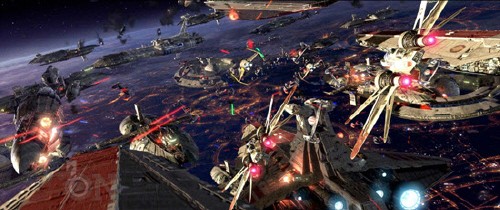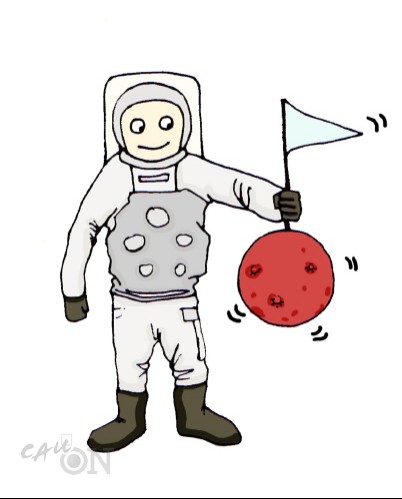
The Republic was staggered by an attack by Lord Sith and Count Dooku. General Grievous, who is a vice ruler, has invaded the capital of the republic, kidnapping Chancellor Palpatine. The Republic’s army has attempted to escape with a cherished hostage out of the encircled capital. Two Jedi Knights are leading the rescue of the chancellor. It has only been three years after starting the war, and the discord between Palpatine and the Jedi is so mixed that the war has intensified out of control.
This is the plot of the new ‘Star Wars’ movie. It is a galaxy far away from earth. Most people think that this is not real, but a fabulously fancy. However, it may be a real life in the near future. These kinds of movies will not be found in the science fiction (SF) section of the video shop anymore. Nations are fighting and collaborating for space.
This year is the 50th anniversary of the world’s first satellite ‘Sputnik’ launch. The history of space development began with ‘Sputink’. After a month, Russia launched the second, 2 Sputnik. The U.S lost the opportunity to lead in the race for space, and becoming pioneers, but they have since launched space shuttles. Then, France launched an artificial satellite in 1965; we call this time in history stage 1 for the exploration of space. Space development has been predominated by the U.S, Russia, and Europe in the past, but Japan, China, India and other countries who want to achieve supremacy in Asia are joining the competition. Russia struggled to regain its pride as a pioneer of space and the U.S has started projects, and an astronaut program. China has a plan to probe the moon with Russia in 2009 and construct a base there by 2030. Japan was determined to succeed in launching an orbital satellite ‘Gaguya’ last month, and their success has encouraged them to announce they will dispatch an astronaut by 2020. Also, India aims to launch ‘Chandrayann’ early next year and to land on the moon by 2020.

The reason so many countries compete in the race for space means that they are the most developed country in the world for this age, because space development needs a lot of money and high technology. It has become the standard appraisal or benchmark of an advanced country.
Alvin Toffler says that space is a ‘New world territory of untapped riches.’ The reason advanced countries are competitively investing in aerospace is that it is both a core of national security and a higher value-added business. Achievement of geographic information and clever location searching through artificial satellites are one of essential techniques in national security. Moreover, when high technology for aerospace transportation is developed, the technology can be shared and adapted to fields, such as aircraft and automobiles. In other words, space development is a necessary role in the protection of national interest and increasing national power.
Finally, these scenarios led experts to decide to construct an International Space Station (ISS) in 1998. Since then, Russia and the Europe Space Agency (ESA), Japan and 16 other countries have been aiming to complete an ISS by 2008 with the U.S National Aeronautics and Space Administration (NASA), which leads the way. It will perform research on the congestion in space; observe heavenly bodies, and other experiments. On the other hand, some Americans are opposed to the project, because a space station does not have any practical benefit. Congress and some specialists assert that the project is unnecessary. They say it must be abolished and is needless to wait until 2010. They are raising a question about the multibillion dollars investment through of taxes.

Opponents of space development insist on investing in social welfare instead of aerospace technology, which needs a great budget. In the past, U.S President Kennedy was blamed for his space development plan. People though it was a forged and hasty plan for a war against Russia. Despite those oppositions, many countries are struggling, having a purpose to achieve victory in the competition for space, because artificial satellites are important in the 21st century.
Astronauts, opponents think, are wearing black gloves to make stronger rockets for move to actually make weapons. That is to say it is like an extended version of imperialism when powerful countries enjoy sticking a flag in the ground game for possessing a colony. It is just a change of stage from land to space.
Space law involves the regulation of heavenly bodies, space, and the rules about operating in space and international cooperation. The Committee on Space Research (COSPAR) determined that nuclear testing will not be done in space, Nuclear Test Ban Treaty in 1963. The U.S insists that there are non-threatening military operations has to be permitted, but Russia sticks to the standpoint that no military operations can be allowed. Meanwhile, the biggest problem in space law is about using artificial satellite orbits in order to communicate. The Communications Satellite Corporation from the U.S. is being attacked for its monopoly. International Telecommunication Satellite Organization (INTELSAT) putting the squeeze on the U.S about the international telecommunication industry.
Korea has developed 11 satellites, and has a plan to launch a small-size satellite, Science and Satellite Technology (STSAT)-2. Moreover, Naro Space Center will be established in Goheung in June next year.
Who becomes the first pioneer of space development is a main issue, because no one can claim a right to space. But it makes you concerned that if space development will become a new path-finding way to the future or a new type of world war.
Therefore, we have to choose weather we want to scratch a lottery or not.
Hyochoong Bang a Professor in aerospace engineering at KAIST
Curiosity 1: What do you think of the assertion that space development deepens the gap between the rich and the poor among nations?
Opinion: These days, there are many technical approaches to low-cost operations. Actually, it is possible to achieve a high-definition image below the 200kg range and to practice diverse experimentation using a 20kg range nano-satellite. Therefore, the level of space technology among nations is improving together.
Curiosity 2: What effect does international cooperation through a space station bring? Is there any possibility of conflict?
Opinion: Various scientific achievements through a weightless state of experimentation can be expected in a space station. Of course countries are participating, but it will be enlarged in its range. The possibility of conflict can hardly be expected now. However, an invisible race in scientific experimentation can happen.
Curiosity 3: What is required to ensure international clarification for space technology development for peaceful purposes?
Opinion: Nations proclaim peaceful space development externally but in reality, many nations have military purposes. There are many international institutions as an affiliated organization of the U.N. These institutions are expected to control the discord among advanced space technology powers.
Curiosity 4: Korea is moving to develop space. Does Korea have any competitive power against the big powers?
Opinion: Korea has strived for space development for the last 20 years. As a result, Korea has a good technique in earth observation. However, core technology and potential resources are still feeble. Relatively, human resources and experience are not enough.
Curiosity 5: SApace development has an enormous danger. How does it influence mankind?
Opinion: It is a future-oriented technology. We have to place more weigh on the benefit rather than the risk. The reason for active probing the moon project is that there is a potential future energy, which is not in earth. On that score, space development has the aspect of preparing for the future.
Curiosity 6: From the perspective of open humanity, what effort is needed?
Opinion: It is a collective international spectacle for the development of a space program, like probing the moon. In addition, there is another way to advance a country’s share in technology and information with developing countries. For example, technology can be used for forecasting natural disasters and global warming can be prevented to some extent. Bang has positive attitude toward space development. However, it is just one of "opinion" among opposite and diverse opinion. Therefore, we have to think about that agenda seriously since space development will affect future human life somehow or other.


